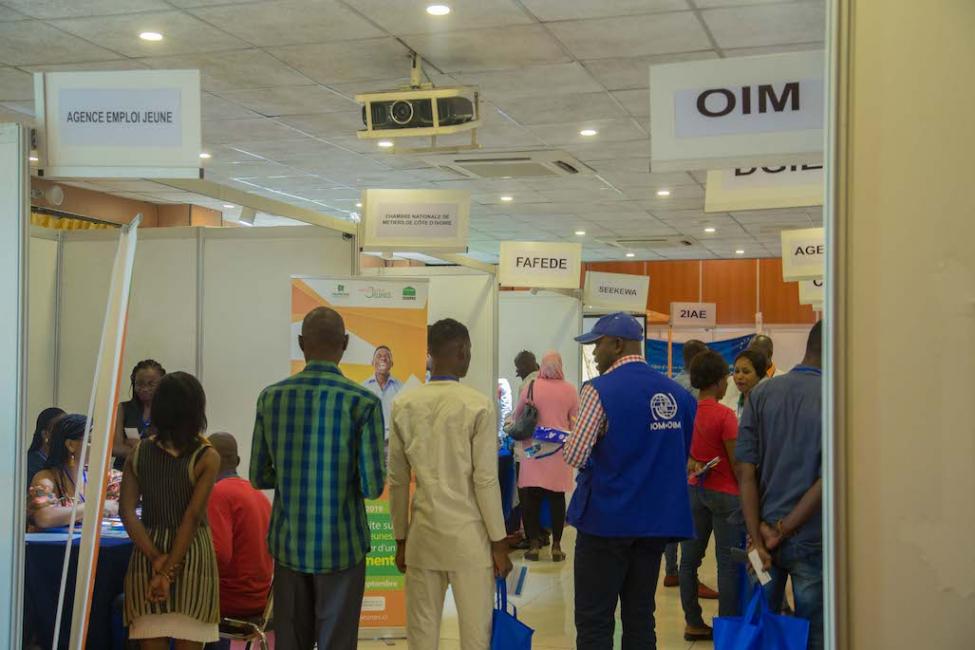-
Who we are
WHO WE AREThe International Organization for Migration (IOM) is part of the United Nations System as the leading inter-governmental organization promoting since 1951 humane and orderly migration for the benefit of all, with 175 member states and a presence in 171 countries.
-
Our Work
Our WorkAs the leading inter-governmental organization promoting since 1951 humane and orderly migration, IOM plays a key role to support the achievement of the 2030 Agenda through different areas of intervention that connect both humanitarian assistance and sustainable development.
What We Do
What We Do
Partnerships
Partnerships
- Where we work
-
Take Action
Take Action
Work with us
Work with us
Get involved
Get involved
- Data and Research
- 2030 Agenda
Job Fair in Côte d’Ivoire Promotes Reintegration of 350 Returned Migrants
Abidjan – The International Organization for Migration (IOM) has assisted over 5,250 stranded Ivorians to voluntarily return to Côte d’Ivoire over the past three years, from countries such as Libya, Niger and Morocco. Despite the logistical difficulties, the journey home turned out to be the easy part.
The returned migrants face the challenge of reintegrating themselves into their former communities. They can face rejection, the stigma of unemployment and the shame of returning empty handed.
To mitigate these challenges, more than 2,000 returning migrants have received reintegration assistance through trainings and income-generating activities through initiatives supported by the European Union Emergency Trust Fund for Africa (EUTF).
It is in this regard that last week, IOM hosted a job and training fair organized for returned migrants in Côte d’Ivoire. About 350 young men and women attended.
The event targeted Ivorians who returned home between 2017 and 2019 under IOM’s Assisted Voluntary Return (AVR) programme as part of the EU-IOM Joint Initiative for Migrant Protection and Reintegration.
“Thanks to this fair, I realized that I had not been abandoned. I have chosen three reintegration projects that will facilitate my reintegration into society. I will do my best to have a better future in Côte d’Ivoire, instead of risking my life in the Mediterranean or in the desert. If ever I must go to Europe, I will use the legal channels, and I will go to visit and return to my country,” said Moussa, one of the young returned migrants who visited the fair.
During the three-day job fair, 22 IOM partners presented participants with a wide range of available job opportunities covering various fields including construction, poultry and transport. The posts are being offered across Côte d’Ivoire, in the capital, Abidjan, as well as in Bouaké, Daloa, Man, Gagnoa, San-Pédro and Korhogo.
Former beneficiaries of the assistance shared their experiences and advice. IOM also assisted some of the participants in designing a sustainable professional project tailored to their profile and aspirations.
“We are happy to participate in this fair which gives these returned migrants a second chance for reintegration in their country of origin. It was an opportunity for us to showcase all our activities so that they can define their own future,” said Hyppolite Kakou, from the National Agency for Vocational Training (AGEFOP), an IOM partner.
Based on the beneficiaries’ needs and skills, reintegration projects can be individual, collective (provided to several returned migrants as a group) or community-based, i.e., involving returned migrants together with community members.
At the fair’s conclusion, all participants were encouraged to submit their professional goals for review and register with IOM’s partners. They were also able to participate in several side activities such as dialogues on female entrepreneurship and the challenges of reintegration. Participants also attended therapeutic/ creative workshops in theatre, slam and art therapy.
“The participants expressed themselves freely in a judgement-free space. They need intensive follow-up, and some need to be listened to. Since their arrival, they wanted to discuss, express themselves, share their experiences and their journey. In art therapy, we stimulate a lot creativity and speaking,” said Souhad, an art therapist.
This event was funded by the European Union under the EU-IOM Joint Initiative for Migrant Protection and Reintegration.
IOM’s efforts were supported by the Government of Côte d’Ivoire, represented at the job fair by several State structures, including the Directorate General for Ivorians Abroad (DGIE), Child Protection Directorate (DPE), Youth Employment Agency (AEJ), National Agency for Vocational Training (AGEFOP), and National Agency for Support to Rural Development (ANADER). These reintegration programmes are implemented jointly by IOM Côte d’Ivoire and its various partners, state structures, civil society organizations and private sector actors.
For more information, please contact Lavinia Prati, IOM Côte d’Ivoire, Tel: +225 80 07 01 27, Email: lprati@iom.int
